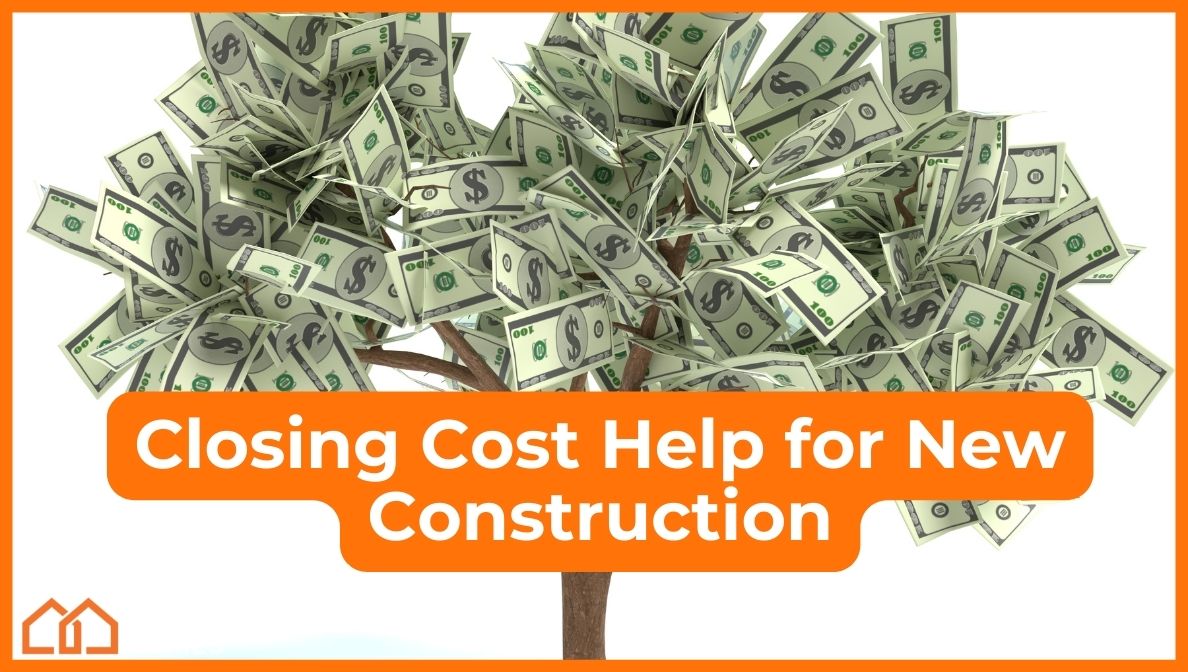Closing Cost Assistance and Down Payment Assistance for New Construction Homes
If nothing on the market sparks your fancy, or if you’re tired of renting properties that seem to require maintenance calls every other month, the idea of a new construction home may appeal to you. After all, brand new homes don’t have the typical repair issues that older homes have, plus they come with all the modern amenities on your wish list.
But how do you get a new construction home if you don’t have enough cash for closing costs and a down payment? What about being able to afford one in this era of higher interest rates and purchase prices? Understandably, people interested in new construction real estate have a lot of questions like this.
If you’re borderline on qualifying for a home loan and need a leg up, then you will be delighted to know that the federal government and your state may have programs to assist people like you in achieving the dream of homeownership.
What are closing costs?
Closing costs refer to the fees and expenses associated with finalizing a real estate transaction. These costs typically include fees from third-party vendors, such as title searches, appraisal fees, recording fees, title insurance, home inspections, and attorney fees.
Additionally, closing costs may include a loan origination fee, an application fees, underwriting fees, and paid down points (prepaid interest).
Other common closing costs include property taxes, homeowner’s insurance premiums, and escrow deposits. If you have any further questions about what closing costs may be on your final loan estimate, speak with your loan officer or realtor.
What is a down payment?
A home down payment is a lump sum of money that you pay upfront when purchasing real estate. It is usually a percentage of the total purchase price and normally paid in cash. It demonstrates your commitment to the purchase and reduces the amount of money needed to borrow through a mortgage loan.
The size of the down payment changes depending on various factors such as the type of mortgage, the lender’s requirements, and the buyer’s financial situation.
Overall, a larger down payment leads to lower monthly payments and when paid down enough, can even eliminate private mortgage insurance (PMI).
How to Save on Closing Costs and Your Down Payment
1: Start with Federal Programs
Before you check out what your state can offer, you can cover a lot of ground by exploring loans and incentives backed by the federal government. These are especially helpful to first-time homebuyers get their dream home even without a nest egg or home equity.
-
FHA Loan: If you are a first-time buyer, you can apply for a new construction loan through the Federal Housing Administration, which offers lower down payment requirements, reduced interest rates, and fee limitations.
-
VA Loan: If you served in the military, you may qualify for a VA loan from the Department of Veterans Affairs, which allows you to put 0% down! This is an incredible benefit to anyone in the trenches of the home buying process.
-
USDA Loan: Another option for 0% down is if you find a qualifying property through an RD loan through the U.S. Department of Agriculture (USDA). You must make sure the new construction home qualifies for this loan type with your mortgage lender before committing!
If you prefer a conventional loan, understand that the qualifications will be steeper because government funds don’t back this loan option. The minimum down payment for a conventional new construction loan is 20%, which first-time buyers don’t typically have without equity.
-
Another Savings Opportunity: The federal government also offers a mortgage tax credit certificate (MCC) to qualified homebuyers, which lowers your federal tax bill and makes your monthly payments more manageable. This major perk is available for up to 30 years after you buy your home (as long as you don’t refinance or sell it). You MUST ask your lender about this credit to get the certificate during underwriting, or else you’ll miss it!
2: Check Your State for Closing Cost Assistance
Every state has unique programs that can help homebuyers access funds to supplement closing costs and down payments. Instead of reinventing the wheel, let’s give credit to The Mortgage Reports for making this incredible list of homebuying assistance and grant programs for all 50 states. Simply scroll down and click on your state to find the organizations and requirements for getting aid.
If you find a program that you may qualify for, inform your lender during the loan application process so that they can factor them in. The more benefits you get, the easier it will be for you to afford the sales price of the new home.
When you combine the benefits of federal loans with state assistance and grants, you can lower your out-of-pocket expenses and total loan amount.
Michigan Down Payment and Closing Cost Assistance
Since many of our readers hail from The Great Lakes State, we want to have this information upfront. The Michigan State Housing Development Authority (MSHDA) offers down payment assistance (DPA) loans that can provide up to $7,500 to a qualified homebuyer. This can be a significant help to propel the move-in to your new home!
Also, select zip codes can qualify for the MI 10K DPA Loan, which can offer up to $10,000 in aid. Check out this list of eligible ZIP codes to see if you qualify!
-
But wait, there’s more: MSHDA also has programs to help homeowners after they buy a home if they are delinquent on certain housing expenses like utilities or mortgage payments. These funds are subject to fluctuating availability, so continue to check this link to get updates.
Look for Builder Incentives Too
Another option is to go with the builder’s preferred lender and explore their financing incentives, which can help with closing costs to lower the loan’s overall costs. By combining federal mortgage loans, state homebuyer programs, and builder incentives, you can make your new home purchase far more accessible than you once thought.
Disclaimer: This article is for informative purposes only. For complete and accurate information, speak to your trusted financial advisor.
Alicia Persson is a Content Strategist SEO writer at Marketplace Homes, utilizing previous years of experience on real estate teams that specialized in investments and property management. Before she joined Marketplace Homes, she was also a freelance writer for 7 years, leading to a specialization in real estate and home living content for boutique digital marketing agencies. During her writing years, she learned the basics of SEO and gained experience writing for many different clients, making her versatile at creating diverse content.
She is a proud University of Virginia master’s graduate and enjoyed her undergraduate years at the University of Mary Washington. When Alicia is not writing, she plays keytar and sings in a local 90’s rock cover band, or she spends time with her amazing family.


